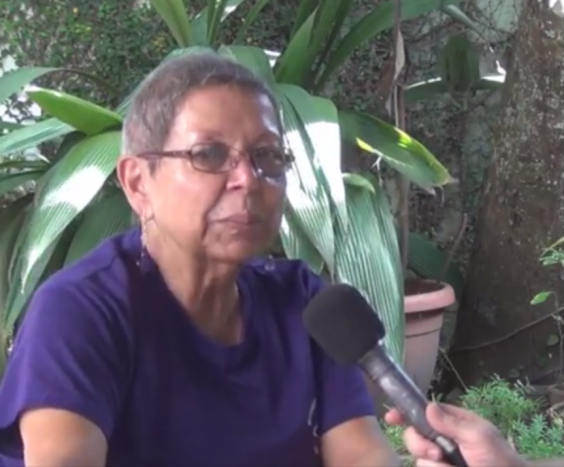The Crooked Ways of the Honduran Justice System
by Dina Meza translated by Nelson Eddingfield / February 18, 2015 / No comments

Two recent cases against a journalist and a women’s advocate demonstrate the corrupt nature of Honduras’s courts.
The judiciary branch, one of the country’s three state powers, drives justice in Honduras. Its actions are supposed to align with the law, but in the majority of cases its rulings are directed by political and economic influences.

- Honduras has one of the world’s highest murder rates. It is also one of the most dangerous countries to practice journalism, ranking 129th out of 180 in the 2014 World Press Freedom Index. Journalists are regularly threatened, attacked, and killed for their work. The Honduran government fails to punish those who use violence against reporters, essentially granting them impunity. This space will be dedicated to examining the lack of protection for Honduran journalists exercising their profession. Topics will include the use of state-sponsored advertising as a mechanism to reward or punish publications, and censorship and self-censorship as hindrances to democratic progress.

- Born in Cofradía, Honduras, Dina Meza has been recognized by PEN International, Amnesty International, Index on Censorship and Reporters without Borders for her work as a journalist and human rights advocate. Currently, Dina is the driving force behind the creation of Honduras PEN Centre. In 2013, she wrote “Reign of Terror,” an in-depth report on threats to Honduran journalists for Index on Censorship’s magazine. In 2014, she was named one of Reporters Without Borders’ “100 Heroes and Heroines of Information.”
A poor person’s trial is not the same as a trial for a wealthy person or someone in society’s powerful inner circles. While the poor are sent to prison, generally without any evidence, the powerful remain free, even if they have committed crimes against humanity or are involved in acts of corruption. In the most severe of cases, the wealthy are placed under house arrest.
While the poor are put in shackles and denounced as dangerous criminals, the rich and powerful are protected behind police and military barriers, permitted to hide their face, and allowed whatever comforts they desire. Justice kisses the dagger of gold and punishes those who walk barefoot.
The system of justice fails to protect the majority of the Honduran population: not only the poor, but also those who defend the rights of the people.
I want to exhibit two examples that illustrate this point, one concerning a journalist and the other an advocate for women’s rights. Both were involved in lawsuits concerning both the right to exercise freedom of expression and to defend human rights.
First, I refer to the 2014 case of Julio Ernesto Alvarado, who was punished for the simple act of reporting on a professor from the Universidad Nacional, who publicly denounced acts of corruption committed by one of his colleagues. Alvadaro was only a vehicle delivering the message, yet the journalist was sentenced to a year and four months in prison and suspended from the journalistic profession.
As Alvarado’s case is highly emblematic of the state of journalism in Honduras, it came to the attention of the Inter-American Commission on Human Rights (IACHR). The IACHR sent out an interim measure, requesting that the State of Honduras suspend the sentence while the case was thoroughly reviewed, as it violates fundamental rights and promotes the censorship of journalists.
While the Honduran government is reluctant to respond to this measure, Alvadaro is very happy with the resolution. This case has gravely harmed the right to freedom of expression in Honduras. “Today I write a rose-colored article because I am afraid they will take me to jail and suspend my journalistic license,” Julio Ernesto Alvarado told me heavily.
In December, the mayor of La Paz sued journalist Gilberto Galvez for a Facebook post that criticized the expense of constructing a bridge in La Paz. Galvez is facing charges of libel and defamation, and fears for his life.
The other case involves Gladys Lanza, an advocate for women’s rights. The husband of a Liberal Party politician, a man with much political power, brought Lanza to court. She and the organization she coordinates, el Movimiento de Mujeres por la Paz Visitación Padilla (the Visitación Padilla Women’s Movement for Peace), organized a demonstration in front of his office in the name of a female employee he had sexually harassed.
The trial progressed very quickly. A trial court issued a resolution on January 28, condemning Lanza to more than a year in prison. The exact duration will be known on February 25, when the court finalizes its decisions on the punishment. It is very probable that they will suspend Lanza from coordinating her organization and/or freeze her bank accounts. When the arbitrary behavior of a biased justice system continually gets out of hand, anything could happen.
I was there during the two days the trial came to a close. The judge who coordinated the tribunal did not hide his preference for the plaintiff; it was on display to everyone in the room, to the point of being highly offensive to the women present. He prohibited those attending the trial from making the slightest gesture. An impartial tribunal would have been conscious of this offense and recognized the action as the characteristic behavior of an aggressor.
This case may set a precedent for silencing women’s organizations that defend future victims of workplace harassment. The criminalization of the protection of human rights deepens, and, furthermore, violates the right to protest. It sends a convincing message to organizations that defend women assaulted by powerful men.
The situation Gladys Lanza is facing is a clear example of how, in Honduras and in other Latin American and Caribbean countries, the justice system criminalizes those who legitimately exercise their right to defend the rights of others. Amnesty International indicated this in its report on increasing violence against defenders of human rights in the Americas, on December 9, 2014.
The Honduran justice system, corroded by the peddling of influence and a patriarchal mentality, does not apply equally to all.




